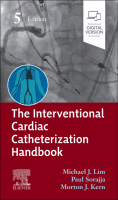Physical Address
304 North Cardinal St.
Dorchester Center, MA 02124

Key points Percutaneous coronary intervention (PCI) of bifurcation lesions can be complex requiring several equipment types and intraprocedural decision making. Various classification systems exist for bifurcations to guide treatment decisions, but the Medina classification is most commonly used. There are…

Key points Intracoronary calcification creates significant challenges for interventional procedures due to suboptimal stent expansion and associated poor long-term clinical outcomes. Atherectomy tools are designed for modification of intracoronary calcification to allow balloon and stent expansion. Coronary thrombus presents a…

Key points Angiographic determination of the significance for a given coronary lesion remains limited. Numerous physiologic indexes are now available that rely on coronary hyperemia (fractional flow reserve [FFR]) and nonhyperemic indexes [aka NHPR] (e.g., instantaneous wave-free pressure ratio [iFR],…

Key points Guiding catheter selection remains one of the essential pieces enabling a successful coronary intervention procedure in the cath lab. Alternatives, such as using sheathless guides and guide catheter extensions, are now available to facilitate interventional procedures. Numerous coronary…

Key points Anticoagulant and antiplatelet medications are required for the safe percutaneous coronary intervention (PCI). Recent studies have demonstrated that shorter durations of dual antiplatelet therapy (DAPT) are safe. Vasodilators and vasopressors may often be necessary in some complicated or…

Key points A significant source of complications from catheterization procedures continues to arise from the site of access. Ultrasound-guided access is the preferred method regardless of access site. There are several options for the best site of access, including the…

Key points Percutaneous coronary intervention (PCI) procedures in today’s cath lab require assimilating numerous details regarding a patient’s clinical history, testing before catheterization with anatomic information provided from the diagnostic angiogram. PCI requires an understanding of anticoagulation therapy, guide catheters,…